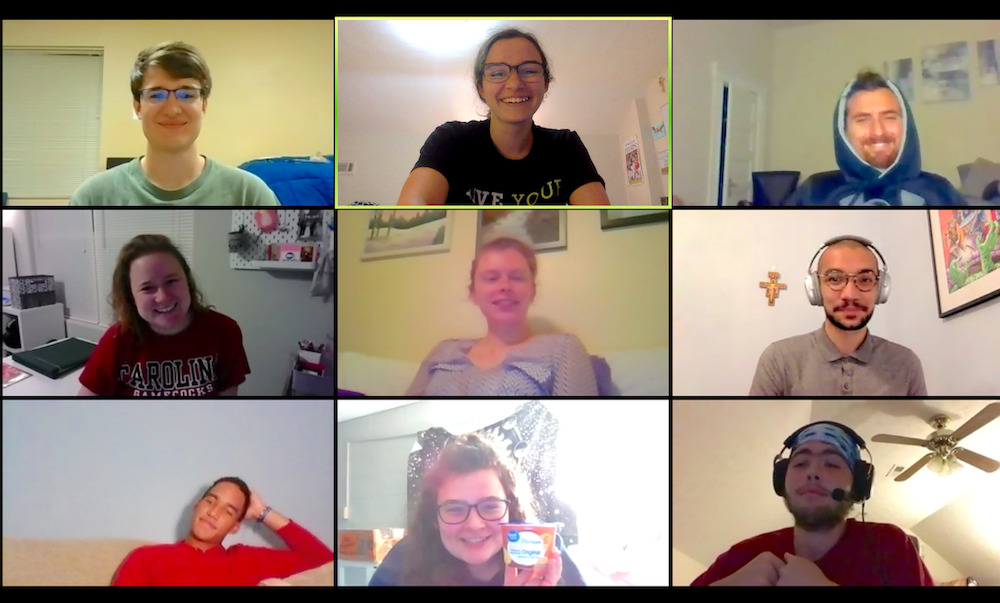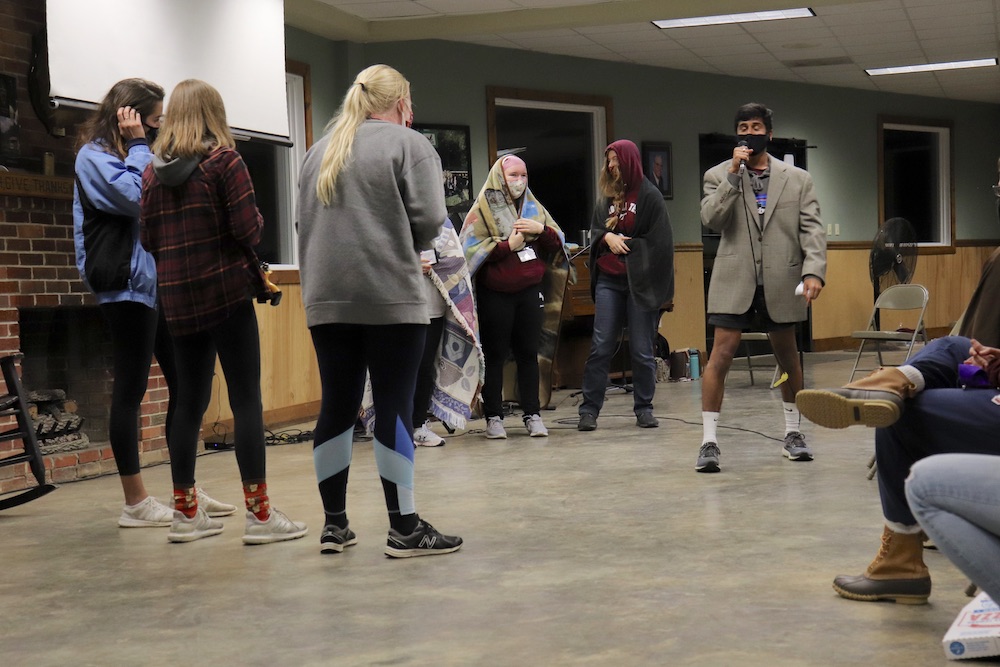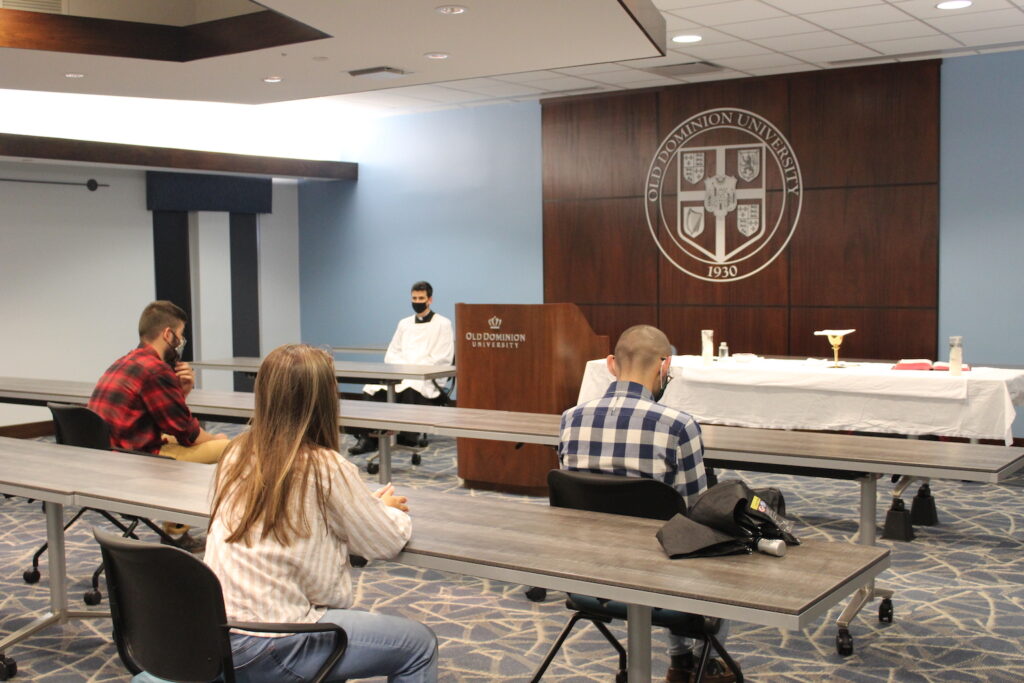How college campus ministries serve in midst of COVID-19
College is a time of transition — a time to adapt to new places, to make new friends and to prepare for careers.
In the era of COVID-19 restrictions, Catholic campus ministries (CCM) are also adapting right alongside of those they serve, finding new ways to support students and to give them opportunities to grow in their faith.
“Campus ministries have been really creative in adjusting to the new rules,” said Andrew Waring, acting director of the Diocese of Richmond’s Office of Evangelization. “It’s actually been exciting, thinking how we can best serve our students, how we can help campus ministries still do their best work.”
Part of the challenge, Waring said, is that each campus ministry must follow not only the restrictions set by the governor and by the diocese, but those set by their particular college or university as well. Guidelines may also differ from region to region and may change, becoming more or less restrictive, depending on the rise and fall in case numbers.
“What campus ministry might look like will vary from campus to campus,” Waring said. “We have to stay flexible. We never know when another announcement might come.”
The priority of campus ministries across the diocese, Waring said, is to make sure that Mass is available to all students. Beyond that, the teams at each campus had to be creative.
All are welcome
Marissa O’Neil, campus minister at Old Dominion University, explained that at her school, in-person, on-campus events are permitted with the approval of ODU’s Office of Leadership and Student Involvement.
Through an agreement with a neighboring campus ministry, the CCM has gotten permission to celebrate Mass twice a week this semester – on Thursdays at the university’s student center and on Sundays at the Baptist Collegiate Ministry building where there is room to accommodate more students.
“The BCM is amazing for allowing us to use their space on Sundays,” O’Neil said. In return, she said, CCM students reset the room and sanitize surfaces after each Mass.
Guidelines for Mass are simple, she said, since campuses follow the same protocols set by the diocese for parishes: there are sign-ups, masks and social distancing.
Soul Food, however, a weekly event in which students gather to share a meal and to listen to a guest speaker give a talk on some aspect of the Catholic faith, presented problems on two levels.
“We can’t have that many people all together, and we can’t serve food we’ve prepared,” O’Neil said. “So we had to think of how we could adapt it.”
She and the student leadership team decided to take the dinner online, creating Zoom meetings that students can join as they have dinner at home. It’s a decision, she said, that has yielded some unexpected and even serendipitous results.
“It’s given us a little more latitude in what speakers we can engage,” O’Neil said. “We’ve been able to reach out, to extend invitations to those beyond just the local area.”

ODU hosts virtual game nights. (Photo/ODU Catholic Campus Ministries)
Savannah Coons, a junior at ODU and president of the university’s CCM, said that holding Soul Food online has also made more room at the table for students who might not typically participate.
“At ODU, we have a lot of commuters,” she said, “and, even if they can’t come back to campus in the evenings, they can join in from home. Also, those who might have been intimidated by just coming to the house aren’t afraid to drop in online.”
Being present to each other
Laura LaClair, campus minister at Christopher Newport University, said that she has also noticed ways in which restrictions have a silver lining.
Because students are not allowed to go in and out of dorms other than their own, she said, it’s led students to reach out to neighbors who might be right across the hall.
“It’s encouraged them to go deeper rather than broader with their friendships,” she said.
LaClair said she also hopes to help foster new friendships on campus by making sure that the ministry’s small group Bible studies can continue.
She’s spent time rearranging the furniture at the ministry house, she said, making space for students to meet and still maintain their distance, while ensuring that the house still exudes a welcoming feel of a home away from home.
“I still want them to have the chance to meet with people in person,” LaClair said. “There’s nothing that quite replaces actually being together, spending time face to face in the way Jesus made himself present to us.”
“College is hard enough, starting out at a new place, making new friends. If we make friends with Jesus and with each other, then we will be OK,” she said.
Time to flourish
CCM students are not only finding ways to make do, but even to flourish — to enjoy some camaraderie and a bit of fun.
LaClair said that CNU’s ministry has found a way to give students a break from studying by giving their traditional Sunday Suppers a makeover, turning them into Sundae Sundays.
“I found some individually-wrapped ice cream cups that we are allowed to serve, and then we’ve extended the hours,” she said.
By adopting an open-house format, LaClair said, students are free to come and go throughout the afternoon, so there is never too large a crowd.
ODU has also embraced some new practices, putting the “zoom” into Zoom meets for a series of online game nights.
“For one of the game nights, we had a scavenger hunt,” Coons said. Students were given a simple item to find — anything from a spoon to a broom to a pair of batteries — and then had to race to be the first one with the item back to their screen.
“It was actually a lot of fun,” she said. “Overall, it’s been working out, despite COVID. We are grateful for what we can do.”
“My student leadership team has been exceptional,” O’Neil said. “They accept every new guideline, every new rule, and come up with ways to work within them. They just go on with the attitude that it could still be a good semester — a growing and fruitful semester.”
‘Can’t stop believers’
For “Catholic Hoos” at the University of Virginia, departure from the Grounds began in March, in the middle of spring break.
As COVID-19 spread, the university canceled in-person classes and all other meetings and activities on the Grounds, as the school’s campus is called. It meant the end of Tuesday night suppers together, or TSup, small group meetings, just talking after Mass.
“There was an aspect of the ministry that was lost, the incidental,” said Dominican Father Joseph-Anthony Kress, chaplain, in a July video chat. “The accidental side where you can just run into a student after Mass, or walking across the Grounds you can catch somebody as they walk out of a library. I think we all strive to build a ministry that’s based on relationships and not about programs or events because our faith is about a relationship with our God, and we try to reflect that in our ministry.”
Father Kress said some in this diaspora began to say the rosary online together at noon, then the Divine Mercy Chaplet at 3 p.m., night prayer around 11p.m., and then morning prayer. The students saw that “our churches were empty, but so was the tomb,” he said. “That’s because Christ was out among us. His presence is among his people, and to follow the movement of the Holy Spirit and where he’s leading us is unprecedented…it’s going to lead us to a new horizon.”
The students missed each other, but they’ve found isolation can be a gift.
“One student reflected on how if they don’t come out of this as holier men and women because all distractions have been taken away, then we haven’t used the grace of God that he’s offering,” Father Kress recalled. “We take this time for deeper prayer, to invest in people that we have neglected, people that we can’t run away from them right now, that we have to love.”
When they returned in August, students found that TSup is now HelloTSup, where they can pick up a meal kit on Tuesday to cook with their roommates. From feeding 80-100 people in person, they’re now providing 130-135 meals a week.
Before the pandemic, Father Kress said there were a dozen Bible study groups with about 80-90 students in all. Now, there are 26 groups with close to 200 members. Somewhat apologetically, some students tell him that the pandemic is one of the best things that has happened to their faith.
“Even pandemics,” Father Kress said, “can’t stop the community of believers in Jesus.”
Choosing between fearfulness, recklessness
Chris Hitzelberger, director of Catholic Campus Ministry at Virginia Tech, said campus ministers are facing several challenges. One is to provide the essential elements of Catholic life — daily Mass, reconciliation, adoration — and stay healthy. There are two weekday Masses with attendance capped at about 30 people instead of one for 60-70 attendees. A retreat on Oct. 3 was just one day instead of an overnight stay.
“The second piece is all the other stuff that they’re missing: time with friends, having a meal with someone, social gatherings like tailgating,” Hitzelberger said in an email interview. “And that’s much more challenging, to give students kind of a place in between fearfulness where they don’t want to leave their rooms and maybe a recklessness of, ‘well, I’m gonna be fine’ so just go and do these things.”

Students are finding other ways to meet and talk. Some sit on the porch at the Newman House and connect to their online classes. Or they join a Bible study group.
“The students who are coming to stuff are desperate for face-to-face interaction,” Hitzelberger said. “More freshmen are coming to daily Mass than we normally see.”
Isolation, loneliness and the crush of virtual classes have caused some students to push Church aside for now.
“But I think that there are other students for whom their faith maybe has become the central piece of who they are because of all those other things,” Hitzelberger said. “I’ve seen a couple of students who weren’t daily Mass-goers but now they are.”
Hitzelberger said the diocese has done a good job of finding ways to reach out and support campus ministers.
“I think a lot of it is the work that Andrew Waring has done, but ultimately it comes back to the bishop,” he said, “and I think his emphasis and focus is that this is a really important thing that we do. So, kudos to the diocese for their support.”
‘Pursuing Jesus In different ways’
James Madison University started in-person classes Aug. 26. Within two weeks, over 1,000 COVID-19 cases were diagnosed among students and employees. All students, including “Catholic Dukes,” had to disperse.
“In a typical year, we’d have between 300- 500 students attending Sunday Mass and about 120 more active members attending events, retreats or part of small groups,” said campus ministry director Austin Farinholt in an email interview.
They now have two Sunday Masses instead of three, with one live-streamed. Small groups have transitioned to virtual meetings. Catholic students recently wrote over 80 letters of encouragement to classmates who may still be stuck inside.
“We’ve held different outreach events, and even hired an ad agency to geo-fence around the dorms and target students with ads for our ministry,” Farinholt said.
He said it’s hard to know where some students are in their own faith journeys. A few he used to see no longer come to Mass or adoration. Then, there are those like one young man who had stopped going to church in middle school. He found he had a lot more time to reflect on the meaning of life and on religion.
“He recently came to an adoration night,” Austin said, “and was overcome by the beauty and wonder of it. He’s one of many students I’ve talked to who have used this time as an opportunity to pursue Jesus in ways they previously never had.”

